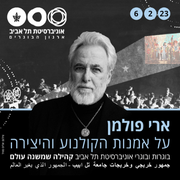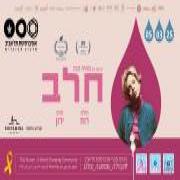TAU Alumni mark World Urbanism Day with a special Webinar
The Tel Aviv University Alumni Organization, led by Sigalit Ben Hayoun, continues its tradition of meetings with inspiring alumni, and chose to shine the spotlight expected changes to everyday life in the big city, caused or enhanced by the COVID pandemic. The date was set, of course, on the World Urbanism Day, celebrated across the globe on November 8th.
Three renowned experts met for a joined zoom Webinar, to discuss burning issues that are disrupting city life and changing the way we live.
The Panelists were:
- Udi Carmeli, Tel Aviv-Yafo City Engineer, Alumnus of the Azrieli School of Architecture, TAU Faculty of the Arts
- Yaara Gooner, Head of Design at the London Real Estate Company Labtech, Alumna of the Azrieli School of Architecture, TAU Faculty of the Arts
- Avishay Kimeldorf, VP of Planning and Chief Architect at Shikun & Binui Real Estate, currently a student in the Executive MBA program of the TAU Coller School of Management
- The panel was moderated by Prof. Tali Hatuka, founder and head of the Laboratory for Contemporary Urban Design in the TAU Department of Geography and the Human Environment.
To Hatuka's question about the significance of COVID regarding urban planning, the three answered in detail:
Udi Carmeli: "The crisis will make a difference, the question is how deep it is going to be, for how long and what to focus on. The typology will change. The city, as a concept of the human existence of all the desires of the human race, will not disappear for those who are looking for it. The crisis enhances both the good and bad sides of urbanism. Its too early to judge and make planning assumptions based on newspaper headlines. We plan 10-20 years ahead, but during the COVID pandemic we took tactical urbanity - following the outbreak of COVID we added 12 new pedestrian zones, small gardens and more bike paths, which would have taken us much more time without COVID."
Avishay Kimeldorf admits "today there is a need for agility and flexibility in planning, the small garden next to the house became a significant activity space for families, the high-rise building has become a safe space, the demand for apartments with balconies and gardens and apartments with a study has increased. Its about knowing what the public wants and needs right now." He also stressed "that flexibility should come from both the developers and the approving bodies, and together we must find the right solutions. The concept of community has also been given a twist, and along with it planning is changing in a more participatory and enabling direction."
Yaara Gooner, from London: "In London as well, there’s a sense of confusion and we are required to adopt flexibility and design creative and quick solutions for adapting our spaces to the new situation.
London is an international commercial city, and proximity to the source of livelihood has become a more important planning factor than ever.
Campuses based on pure mix of uses, enabling a full ecosystem, are now gaining momentum. A resident of the compound can live, work, purchase, eat and spend time in the same compound without having to leave it.
The complexes are not closed, but rather are connected with a number of public spaces and access roads to the city, which encourage pedestrians to walk through the campus and enjoy it too and not just the locals."
The discussion during the second half of the discourse was directed by Prof. Tali Hatuka to the future - what will the city look like following changes such as smart transportation and autonomous vehicles.
Udi Carmeli: "There is no one design solution that works for everyone everywhere. Urban architecture is closely linked to local character and tailor-made for it. Chemistry between people will continue to drive planning forward and leave people in the city, while others will want the opposite. I hope we won’t just live in bubbles. I want to continue to go out into the street and be surprised time and time again. The city has not yet exhausted itself in general, and especially in Israel, which is still considered a country in growth stages. The great educational challenge is the transition to the use of public or cooperative transportation in the future."
Avishay Kimeldorf: "There are a few trends that can currently be identified. I don’t think there’s a trend of leaving the city and returning to the village. This is a marginal phenomenon, and the apparent trend is less about development of agricultural lands into building of mega-neighborhoods outside the city, and more about shifting to work complexes within the cities, which will encourage urban renewal of older areas. In the complex projects, developers will have to adapt to the municipal strategy and develop the complex according to it.
We will see more use of entrepreneurial resources for social purposes, and more use of public land for economic enterprise purposes. There will be a much more substantial treatment of the soft issues that the developer did not touch on in the past, such as the participation of the public and the participation of diverse stakeholders as well as the innovation that trickles into the projects. We also produce flexibility in plans in agreement with municipal bodies. There are more collaborations with the city and there is feedback, where both sides can bring about much better solutions together. The real Real Estate map is the map of public transportation, cooperative transportation and mass transportation, as future centers will be built around them, and this is where the Real Estate world is headed.
Yaara Gooner: "The user experience in the office spaces will change, the population density in spaces will decrease, emphasis will be placed on fresh air, the element of one desk for each employee is no longer relevant, but rather the multiplicity of interaction spaces and strengthening interpersonal connections which can’t be created through the virtual world.
Each new building’s plan will have to meet a large number of strict standards, which will make it possible to brand the building on the market with a Green Building certificate. Bicycles, showers and lockers are now being planned instead of car parking spaces."
Among the viewers, all TAU Alumni:
Ashdod City Engineer Ram Aharoni, Or Yehuda Municipality City Architect Ziv Gadon, Omer Wolf - Senior City Planner in the Tel Aviv-Yafo Municipality, Herzl Arviv - Board Member of the Israeli Export Institute, and many others.




